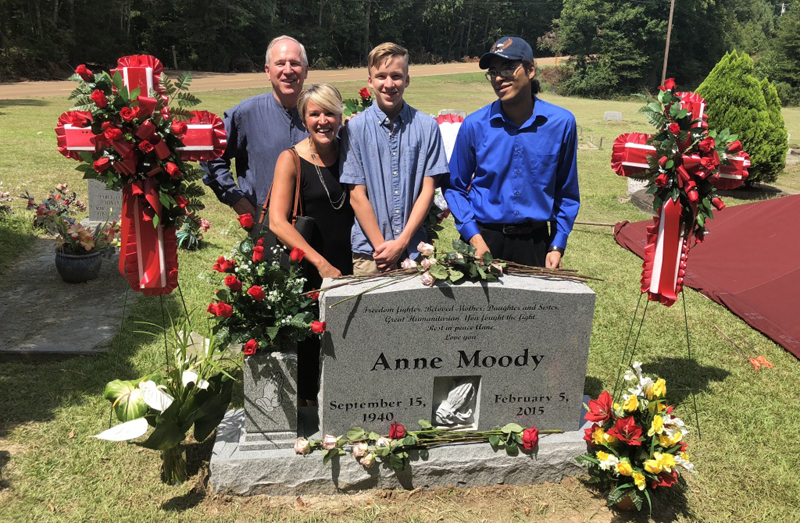Fellowship helps historian tell the life story of civil rights activist
Professor Leigh Ann Wheeler is writing biography of Anne Moody

Spending time in rural Mississippi has been vital to the development of Leigh Ann Wheeler’s latest book project: a biography of the late civil rights activist and author, Anne Moody.
“I’ve been to Mississippi many times and have done lots of interviews,” the Binghamton University history professor said. “I love the work. It’s all about building relationships. I’m now very close to the family. When I’m writing and have a question, I can text Moody’s son, Sasha Straus, or her sister, Frances Jefferson, and they text me right back.”
Wheeler’s book will examine the life of a woman who was on the front lines of the Civil Rights Movement in the early 1960s. Moody was part of the Congress of Racial Equality (CORE) and the Student Nonviolent Coordinating Committee (SNCC), and participated in protests such as the May 1963 Woolworth’s lunch counter sit-in in Jackson, Miss.
In August, Wheeler received a National Endowment for the Humanities (NEH) Public Scholar Fellowship for the project. The $60,000 award allows Wheeler to take a break from teaching for the 2019-20 academic year and focus on research and writing. Most fellowship recipients are institutions, Wheeler said. The book was one of two SUNY-related projects to receive a grant.
“The public scholar component is designed for someone who is writing a book for a broad or popular audience,” she said. “It’s not a fellowship that only academics apply for. Professional writers apply for it, too.”
Wheeler, whose specialties include U.S. modern women, social movements and sexuality, has incorporated Moody’s 1968 memoir “Coming of Age in Mississippi” into her classes for the past 25 years.
“It’s so effective and written in a way that students enjoy reading it,” she said. “It brings them into the life experiences of Anne Moody, a black girl born to sharecropper parents in 1940 who grew up in rural Mississippi. She conveys the experience of that life in a raw, visceral way. Students love it.”
There was little information online in the late 1990s and early 2000s about Moody, who kept a low profile after releasing a collection of short stories called “Mr. Death: Four Stories” in 1975. Two years after Moody’s 2015 death, Wheeler discovered a website run by Roscoe Barnes III, a chaplain at a correctional facility in Wilkinson County, Miss., where Moody grew up and lived her later years. Barnes, who had established the Anne Moody History Project, put Wheeler in touch with members of the Moody family, including several who still live in Wilkinson County, located in southwest Mississippi on the Louisiana border.
Wheeler soon brought the biography idea directly to Moody’s family.
“I wanted to make sure they were comfortable with the project before I took it on,” she said. “I thought: As a white woman coming down from New York, they may think ‘Who is she?’ But they’ve embraced me from the beginning and made it clear they want me to do this.”
Wheeler’s travels to Mississippi have enabled her to visit and interview Straus, Jefferson and several of Moody’s other siblings, including Adline Moody, Ralph Jefferson, and Fred Moody, as well as many cousins and friends. Wheeler has toured the Wilkinson County towns of Centreville and Woodville (where Moody lived and went to school, respectively) and has gotten perspectives and memories from both blacks and whites in the region. She has also donated 50 copies of “Coming of Age in Mississippi” to the Anne Moody History Project.
Moody’s fellow civil-rights heroes are part of Wheeler’s research, as well.
“I’ve found people who worked with her in the movement and canvassed with her, going door to door to get people to register to vote,” Wheeler said. “These are activists who are now in their late 70s and 80s; I’ve got to get these interviews done now.”
Wheeler plans to visit Mississippi several more times and intends to conduct more research on the Moody family history. She has also traveled to France and will soon visit Germany to research some of the places Moody lived as an adult. And every new Moody document that is found produces more people to interview or places to visit, Wheeler said.
“Research can go on forever and I’ll have to determine when I’ve done enough,” she said. “But I’m not there yet.”
Telling Moody’s story after “Coming of Age in Mississippi” ends in 1964 is important to Wheeler.
“She spent most of the 1970s in Europe, where she delivered a couple of public addresses,” Wheeler said. “She published a book of short stories in 1975, and also spoke at several colleges and universities in the 1980s and 1990s. So she wasn’t completely out of the public eye, but pretty close.”
Wheeler, who is working with a literary agent to help connect the forthcoming book with a top trade press, does not yet know when the biography will be completed.
“It’s not like I can go to a couple of archives and everything I need is there,” she said. “It takes a lot of time, but there’s no deadline. I just want to do a good job.”
Wheeler also wants future readers of the book to realize Moody’s life was not rags to riches.
“A lot of students read her memoir and think it’s a Horatio Alger story: ‘Anne Moody, so smart, so pretty and athletic. She made it. She overcame the racism and poverty to go to college and graduate. Civil-rights laws were passed. It’s a success story.’
“But others notice at the end that Anne was thinking: ‘I’m not sure we’re accomplishing anything and I’m getting discouraged.’ When you look at the rest of her life, the cost of the poverty and racism that she grew up in burdened her for life. She suffered from homelessness, hunger and mental illness. It’s going to be hard to write about because it’s sad. It’s not a success story.”
